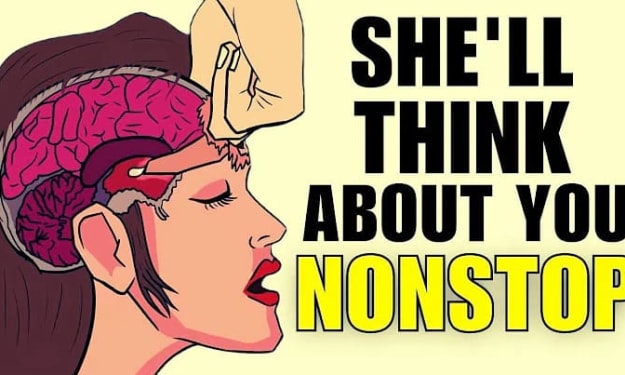addiction
The realities of addition; the truth about living under, above and beyond the influence of drugs and alcohol.


Make Anyone Addicted to You | Dark Psychology
Most of the techniques of dark psychology are manipulative. However, they should be used ethically. If your intention is right, if you want someone to follow you, or if you have a real effect on someone and want them to follow you, okay, this technique of dark psychology can be used.
Jawad AhmedPublished a day ago in PsycheSex and Porn Addiction - The Start of My Road to Recovery
Hello, my name is Paul Stewart and I suffer from sex and porn addiction. I am a sex and porn addict. There, I got that out of the way.
Paul StewartPublished 7 days ago in Psyche

Denial of the Fittest
Even in my periods of deepest denial during my abusive relationship, when I was doing my absolute best to placate him, it was hard to disguise how much I despised spending time with his toxic family.
Veronica WrenPublished 9 days ago in Psyche

Cocked Guns And Cocktails: The Easter Egg Hunt No One Wanted
Wonderful, he’s blackout drunk again. So begins another twisted Easter egg hunt. The grand prize? Surviving another night with my cruel, alcoholic, gun-obsessed narcissist.
Veronica WrenPublished 10 days ago in PsycheThe Wise Man: Navigating Life with Knowledge and Insight
Introduction to the Concept of the Wise Man In a world filled with complexity and uncertainty, the figure of the wise man stands out as a beacon of guidance and understanding. But what exactly defines a wise man? How does one embody wisdom in their daily life? Let's delve into the essence of wisdom and explore how it shapes our existence.
quizat karimPublished 12 days ago in Psyche

The Eternal Quest: Unraveling the Purpose Behind Humans' Insatiable Desire for More
The Eternal Quest: Unraveling the Purpose Behind Humans' Insatiable Desire for More In the vast tapestry of human existence, one thread weaves through the fabric of history, binding individuals and societies together: the insatiable desire for more. This perpetual hunger, deeply ingrained in human nature, manifests in various forms – from the pursuit of wealth and power to the quest for knowledge and enlightenment. While often perceived as a driving force behind materialism and consumerism, could this relentless quest for more serve a higher purpose, guiding humanity towards growth, innovation, and self-discovery?
Kıvanç DemirkıranPublished 14 days ago in Psyche

The Road to Well-Being: A Guide to Stress Management in Modern Life
Navigating Life's Unexpected Twists: Transforming Stress into Stepping Stones for Personal Growth In the fast-paced urban jungle we inhabit today, where surprises lurk around every corner, disrupting our equilibrium, we are challenged to not only adapt but thrive amidst the chaos. Stress becomes our unwelcome companion, casting shadows on our well-being. Yet, within its grasp lies the potential for profound transformation. By deciphering its language, we can uncover invaluable insights, propelling us towards a life of resilience and fulfillment.
Kıvanç DemirkıranPublished 15 days ago in PsycheIs Social Media Ruining Your Life?
Greetings, dear readers! In today's digital age, our relationship with technology and social media has become increasingly intertwined. Did you know that on average, we touch our phones around 2,600 times a day? Furthermore, research indicates that post-Covid-19, the average Indian spends a staggering 7 hours a day on their screens. This excessive screen time not only impacts various aspects of our lives but also takes a toll on our mental well-being. In this blog post, we'll delve into the intricate workings of social media addiction, explore its impact on our lives, and most importantly, provide actionable strategies to overcome it.
Sanjana DixitPublished 20 days ago in Psyche

Exploring the Influence of Childhood Experiences on the Psyche
Childhood experiences play a pivotal role in shaping an individual's psyche. These formative years are a crucial period for emotional, cognitive, and social development. Various psychological theories suggest that early experiences can significantly impact an individual's personality, behavior, and mental health later in life. In this article, we will delve into the intricate ways in which childhood experiences influence the psyche, drawing from both psychological research and real-life examples.
BLESSING COOLPublished 22 days ago in PsycheA Peer Supporter's Guide to Understanding the Definition of Progress in Our Mental Health Journey's
I used to be just like many of you out there, believing that persistent, challenging thoughts and feelings meant I was either regressing or not moving forward quickly enough in managing my ADHD and generalized anxiety. However, I've learned that our conventional 'in with the good, out with the bad' philosophy, while appealing, oversimplifies the complex realities of our mental health challenges.
Sandy PacePublished 26 days ago in PsycheThings I Refuse to Feel Guilty About Doing in My Mental Health Journey
A few weeks ago, I found myself reflecting on my mental health journey since the relapse I experienced nearly a year ago. Instead of succumbing to feelings of shame, I discovered a sense of pride in my progress. Despite the setback of experiencing a relapse for the first time in five years, it served as motivation for me to confront other challenges and obstacles that I had been avoiding in my mental health recovery journey.
Sandy PacePublished 29 days ago in PsycheFIND-HOPE
This one is really testing my selfishness to my self development routine. We have to Change. It’s a tough inner battle. Know that your not the only one. Know you have a purpose. Know you are loved.



















